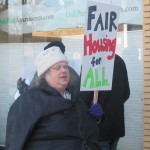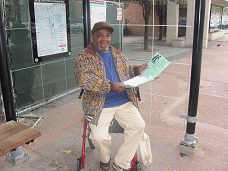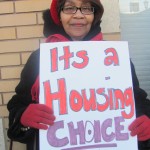Renters’ use of housing choice vouchers, more commonly known as Section 8 vouchers, long has worried communities that the arrival of voucher-holding tenants in a neighborhood will lead to crime and, eventually, lower property values.
That’s not true, says a new policy brief by researchers who studied crime patterns and voucher use in Chicago and nine other large cities over a number of years.
Read more here.
Chicago Tribune – March 29, 2013
Category: Housing Choice Vouchers (Section 8)
Clergy Support Source of Income Campaign
 MTO, Access Living and Progress Center Illinois held a Prayer Breakfast regarding the Source of Income amendment on January 15, 2013 at Pearl’s Place in Chicago. Over forty pastors and community leaders from across the city and suburbs were in attendance to hear from Housing Choice Voucher holders about experiences with discrimination based on their income.
MTO, Access Living and Progress Center Illinois held a Prayer Breakfast regarding the Source of Income amendment on January 15, 2013 at Pearl’s Place in Chicago. Over forty pastors and community leaders from across the city and suburbs were in attendance to hear from Housing Choice Voucher holders about experiences with discrimination based on their income.
Currently, the City of Chicago already prohibits landlords from discriminating against voucher holders. In the suburbs of Cook County, landlords can and do deny people housing solely because they have a Section 8 Housing Choice Voucher. The Source of Income amendment is a protection that would require landlords to consider renting to Housing Choice Voucher holders. It would not force a landlord to participate in the program if the tenant does not meet typical requirements (i.e. poor credit rating, bad landlord reference). The amendment would give people with vouchers the equal opportunity to housing.
On Thursday January 24, 2013 from 2-4 pm at Progress Center Blue Island, MTO, Access Living and Progress Center IL invite you to attend a Town Hall meeting discussing housing discrimination. Come out and share your experiences with us, and help end housing discrimination and segregation. If you believe in equal opportunity, join us and show your support. For more information/transportation call us at 773-292-4980 ext. 224.
Renters Protest Oak Park’s Largest Landlord
 On Thursday, December 13, 2012, more than 40 tenants and advocates from across Cook County picketed Oak Park Apartments’ headquarters on Chicago Avenue to protest the company’s refusal to accept Housing Choice Vouchers. While it may be legal in Cook County suburbs to refuse to rent to Housing Choice Voucher holders, it is not morally right.
On Thursday, December 13, 2012, more than 40 tenants and advocates from across Cook County picketed Oak Park Apartments’ headquarters on Chicago Avenue to protest the company’s refusal to accept Housing Choice Vouchers. While it may be legal in Cook County suburbs to refuse to rent to Housing Choice Voucher holders, it is not morally right.
According to one Housing Choice Voucher holder that lives in Oak Park, who wanted to remain anonymous out of fear of retaliation, “I have been denied occupancy in countless properties including Oak Park Apartments, just because I have a voucher. This is just not fair. I pay my rent yet I cannot live in certain buildings!”
Adam Ballard of Access Living and a voucher holder stated, “Many people with disabilities rely on vouchers for their housing. We want Oak Park Apartments and Cook County to end this legalized discrimination. All we are asking is to be treated like anyone else.”
Currently, the City of Chicago forbids landlords to discriminate against voucher holders. There is no such prohibition in Cook County suburbs. Cook County Commissioner Jesus Garcia, is trying to change that and has introduced legislation that would amend the County’s Human Rights Ordinance to make it illegal to discriminate against Housing Choice Voucher holders.
After the picket, tenants went to Cook County Commissioner Earlene Collins’ office. The group wanted to know why Commissioner Collins had not signed on as a supporter of the amendment. While the Commissioner was away at the time, the group was promised a meeting with the Commissioner.
According to Shirley Johnson, Organizing Director of the Metropolitan Tenants Organization, “Section 8, Housing Choice Voucher Holders are stereotyped and therefore often forced to live in high crime, low opportunity communities. The recent presidential election proved that it is a “new America” where diversity rules. A rental policy that refuses to rent to voucher holders is blatant discrimination and should be outlawed, especially in today’s modern society.”
Oak Park Apartments claims to offer “the largest selection of well-maintained apartments perfect for those who want to experience Oak Park’s architectural character, its excellent school system and vibrant and diverse village feel.” However, they intentionally exclude Housing Choice Voucher holders from these opportunities.
Access Living, Progress Center and the Metropolitan Tenants Organization organized the protest. The groups promised to return. According to Adam Ballard of Access Living, “The fight for our rights has just begun.”
Tenants Lead the Fight Against Discrimination
 Low-income tenants throughout the city are fighting to end discrimination against voucher holders in suburban Cook County. One tenant leader, Mr. Green wages an inspiring daily campaign from his wheelchair. Mr. Green has lived at 1440 S. Indiana for about three years. Residents of the building turn to Mr. Green to act as a liaison between them and the management. His commitment to improving the quality of life for the tenants of his building led him to become a member of MTO. Mr. Green not only works in his building, but also is a regular attendee of the monthly meetings of the Tenants Congress. This group is leading the Source of Income campaign.
Low-income tenants throughout the city are fighting to end discrimination against voucher holders in suburban Cook County. One tenant leader, Mr. Green wages an inspiring daily campaign from his wheelchair. Mr. Green has lived at 1440 S. Indiana for about three years. Residents of the building turn to Mr. Green to act as a liaison between them and the management. His commitment to improving the quality of life for the tenants of his building led him to become a member of MTO. Mr. Green not only works in his building, but also is a regular attendee of the monthly meetings of the Tenants Congress. This group is leading the Source of Income campaign.
In Chicago, it is against the law to discriminate against Section 8 voucher holders. However, in the suburbs, no such law applies. The Source of Income Campaign is fighting to pass a law that will also make it illegal to discriminate against Section 8 voucher holders in suburban Cook County. Although Mr. Green has no plans of moving out of Chicago any time soon, he has made this campaign his fight. His advocacy for this campaign stems from his belief that people shouldn’t be allowed to discriminate regardless of your age, gender, abilities or race, or simply because you use a voucher. His commitment to this campaign has moved him to spend several hours a week by the train station speaking to fellow Chicagoans about this issue and asking them support their suburban neighbors by signing the petition and calling the Cook County Commissioners to support the ordinance.
If you get off at the red line Roosevelt stop, Mr. Green may ask you to sign the petition to stop the discrimination in the suburbs. Make sure to sign it, and ask Mr. Green how you can become more involved.
Get the Facts: Section 8 Protections Fact Sheets
Proposal to Amend the Cook County Human Rights Ordinance:
Preventing Source of Income Discrimination
The Problem:
• The Cook County Human Rights Ordinance (CCHRO) currently protects individuals from discrimination on the basis of a person’s source of income (i.e., child support, social security). The CCHRO however specifically exempts from protection persons with “Section 8” Housing Choice Vouchers. Presently housing providers can and do deny qualified households solely because they have a Housing Choice Voucher. Studies have shown that housing providers often refuse to rent to voucher holders as a pretext for other types of illegal discrimination such as race, familial status, and disability.
The Solution:
• The proposed ordinance amendment would include in the protection against source of income discrimination persons with Housing Choice Vouchers. The amendment would not force property owners to rent any or all of their units to any households using Housing Choice Vouchers. Property owners will still have the right to screen applicants.
• The City of Chicago and six other municipalities in Illinois, ten states, the District of Columbia, and ten counties around the country have laws that protect individuals from discrimination based upon the use of a Housing Choice Voucher.
• Voucher holders are some of the most scrutinized tenants and must meet the rigorous admission criteria of the voucher administrator as well as comply with lease provisions. Nearly 40% of voucher recipients are employed and more than 30% are seniors or persons with disabilities. There is absolutely no evidence that persons who use Housing Choice Vouchers to make their housing affordable perpetuate or increase crime in communities.
• Landlord participation in the voucher program is not unduly burdensome. Landlords only have to complete three simple forms. Payments made by the housing authority are made electronically. Units must pass a Housing Quality Standards inspection. Voucher recipients have to complete most of the paperwork.
• By supporting this amendment to the CCHRO, the last remaining type of source of income discrimination in Cook County can finally end.
HACC Reply to Lincoln Property Company
Supporters of Source Income Protection for Section 8 Voucher Holders:
Access Living
Bethel New Life
Bickerdike Redevelopment Corporation
Chicago Anti Eviction League
Chicago Area Fair Housing Alliance
Chicago Coalition for the Homeless
Chicago Housing Authority
Chicago Lawyers’ Committee for Civil Rights Under Law
Chicago Urban League
Claretian Associates
Citizen Action Illinois
Connections for the Homeless
Evanston NAACP
Ford Heights Community Service Organization
Healthcare Alternative Systems (HAS)
Heartland Alliance for Human Needs & Human Rights
HOPE Fair Housing Center
Housing Action Illinois
Housing Authority of the County of Cook
Housing Choice Partners
Housing Opportunity Development Corporation
Interfaith Housing Center of the Northern Suburbs
Independent Voters of Illinois/ Independent Precinct Organization
Jane Addams Senior Caucus
Jewish Council on Urban Affairs
Jobs with Justice
John Marshall Law School Fair Housing Legal Clinic
Kingdom Community
La Casa Norte
Lakeside Community Development Corporation
Latin United Community Housing Association (LUCHA)
Latino Policy Forum
Lawyers’ Committee for Better Housing
League of Women Voters of Cook County
Logan Square Neighborhood Association
Metropolitan Family Services
Metropolitan Tenants Organization
National Fair Housing Alliance
New Directions for Change
Northwest Side Housing Center
Progress Center for Independent Living
Protestants for the Common Good
Respond Now
The Sargent Shriver National Center on Poverty Law
SEIU Local 73
South Suburban Housing Center
South Suburban PADS
Spanish Coalition for Housing
Supportive Housing Providers Association
Target Area Development Corporation
United Congress of Community and Religious Organizations
West Suburban PADS
Woodstock Institute
Source of Income Protection for Section 8 Voucher Holders
The Cook County Human Rights Ordinance protects individuals from discrimination based on their income (such as child support, social security) however, it specifically does not include protections for people with Section 8 housing vouchers.
With the ordinance as it stands, housing providers can and do deny qualified households solely because they have a Section 8 voucher. Studies have proven that housing providers refuse to rent to voucher holders as a pretext for other types of illegal discrimination based on race, familial status, and disability.
MTO supports the proposed ordinance amendment that would include protection for individuals with Section 8 vouchers. Property owners would still have the right to screen applicants.
The city of Chicago and six other municipalities in Illinois, ten states, the District of Columbia, and ten counties across the country have laws in place that protect individuals from discrimination based on using Housing Choice vouchers.
Voucher holders are some of the most scrutinized tenants and have to meet the rigorous criteria of the voucher administrator as well as comply with lease provisions. Nearly 40% of voucher recipients are employed and more than 30% are seniors or persons with disabilities. There is absolutely no evidence that persons who use Housing Choice Vouchers to make their housing affordable perpetuate or increase crime in communities.
Landlord participation in the voucher program is not unduly burdensome. Landlords only have to complete three simple forms. Payments made by the housing authority are made electronically. Units must pass a Housing Quality Standards inspection. Voucher recipients have to complete most of the paperwork.
By supporting this amendment to the CCHRO, the last remaining type of source of income discrimination in Cook County can finally end.
For more reading, check out this research article which found no evidence that voucher holder households increase crime in neighborhoods.
Affordable Housing Lottery: Apply Now
 The Chicago Housing Authority is accepting applications for tenants who are in need of affordable housing.
The Chicago Housing Authority is accepting applications for tenants who are in need of affordable housing.
Applications will be accepted from June 14, 2010 to July 9, 2010. Of all applications received, CHA will randomly pull 40,000 names from the list. These 40,000 applicants will then be placed on the Family Wait List. If you are put on the Family Wait List, you will be contacted when a subsidized unit is available. If you are eligible to recieve the subsidy, you will then be able to move into an apartment and your rent will be affordable based on your income.
We all know that affordable housing is hard to find, so don’t miss this rare opportunity to get on the list.
For more information about eligibility, applying, or CHA guidelines, go to CHAwaitlist.org
Testify about Your Experience as a HUD Subsidized Renter
 Wednesday, June 30th will be your chance to voice your concerns to Mr. Ed Hinsberger, Chicago Multifamily HUD Director, and Mr. George Gilmore, HUD Neighborhood Coordinator.
Wednesday, June 30th will be your chance to voice your concerns to Mr. Ed Hinsberger, Chicago Multifamily HUD Director, and Mr. George Gilmore, HUD Neighborhood Coordinator.
HUD Subsidized Renters are invited to attend a HUD Townhall Meeting. This meeting is for property-based Section 8 Chicago HUD Subsidized tenants only.
When: Wednesday, June 30th, 2010
Time: 1:00pm till 3:00pm
Where: Access Living
115 W Chicago Ave
The Metropolitan Tenants Organization along with Access Living are providing tenants of subsidized housing a platform to address their concerns regarding maintenance and management of HUD subsidized buildings.
For more information please contact:
Metropolitan Tenants Organization
Farid Muhammad
773.292.4980 x 236
faridm@tenants-rights.org
or
Access Living
Deidre Brewster
312.640.2100 x 132










